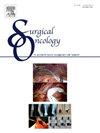Effect of antiviral treatment for hepatitis C virus on long-term outcomes in patients undergoing resection for hepatocellular carcinoma
IF 2.4
4区 医学
Q3 ONCOLOGY
引用次数: 0
Abstract
Background
Hepatitis C virus infection is a risk factor for hepatocellular carcinoma (HCC). The effect of direct-acting antivirals on prognoses remains unclear. We assessed the prognosis of patients receiving direct-acting antiviral and interferon treatment after the initial resection of hepatitis C virus-related HCC.
Methods
We retrospectively analyzed patients who underwent initial hepatitis C virus-related HCC resection at The University of Tokyo Hospital between June 2009 and December 2022. Recurrence-free survival (RFS) and overall survival (OS) were assessed using the log-rank test. Cox proportional hazards model analysis was performed to identify the risk factors for RFS and OS.
Results
Of 756 patients who underwent HCC resection, 142 had hepatitis C virus-related HCC. Among them, the 5-year OS was significantly better in those receiving antiviral treatment than in those without antiviral treatment (72.2 % vs. 48.9 %, P < 0.001); however, RFS did not differ between the groups (P = 0.35). RFS and OS did not differ significantly between patients who received direct-acting antivirals and those who received interferon (P = 0.09 and P = 0.47, respectively). RFS and OS did not differ significantly between patients receiving antiviral treatment before surgery and those after surgery (P = 0.11 and P = 0.23, respectively).
Conclusions
Antiviral treatment improved postoperative prognosis; however, the prognosis did not differ between the types of antiviral treatment in patients with hepatitis C virus-related hepatocellular carcinoma.
丙型肝炎病毒抗病毒治疗对肝细胞癌切除术患者长期预后的影响
背景:丙型肝炎病毒感染是肝细胞癌(HCC)的危险因素。直接抗病毒药物对预后的影响尚不清楚。我们评估了初次切除丙型肝炎病毒相关HCC后接受直接抗病毒和干扰素治疗的患者的预后。方法回顾性分析2009年6月至2022年12月在东京大学医院接受初始丙型肝炎病毒相关HCC切除术的患者。采用log-rank检验评估无复发生存期(RFS)和总生存期(OS)。采用Cox比例风险模型分析确定RFS和OS的危险因素。结果756例行肝细胞癌切除术的患者中,142例为丙型肝炎病毒相关肝细胞癌。其中,接受抗病毒治疗组的5年OS明显优于未接受抗病毒治疗组(72.2% vs. 48.9%, P <;0.001);RFS组间差异无统计学意义(P = 0.35)。直接抗病毒药物治疗组和干扰素治疗组的RFS和OS无显著差异(P = 0.09和P = 0.47)。术前和术后抗病毒治疗患者的RFS和OS差异无统计学意义(P = 0.11, P = 0.23)。结论抗病毒治疗改善了术后预后;然而,丙型肝炎病毒相关肝细胞癌患者的预后在不同类型的抗病毒治疗之间没有差异。
本文章由计算机程序翻译,如有差异,请以英文原文为准。
求助全文
约1分钟内获得全文
求助全文
来源期刊

Surgical Oncology-Oxford
医学-外科
CiteScore
4.50
自引率
0.00%
发文量
169
审稿时长
38 days
期刊介绍:
Surgical Oncology is a peer reviewed journal publishing review articles that contribute to the advancement of knowledge in surgical oncology and related fields of interest. Articles represent a spectrum of current technology in oncology research as well as those concerning clinical trials, surgical technique, methods of investigation and patient evaluation. Surgical Oncology publishes comprehensive Reviews that examine individual topics in considerable detail, in addition to editorials and commentaries which focus on selected papers. The journal also publishes special issues which explore topics of interest to surgical oncologists in great detail - outlining recent advancements and providing readers with the most up to date information.
 求助内容:
求助内容: 应助结果提醒方式:
应助结果提醒方式:


